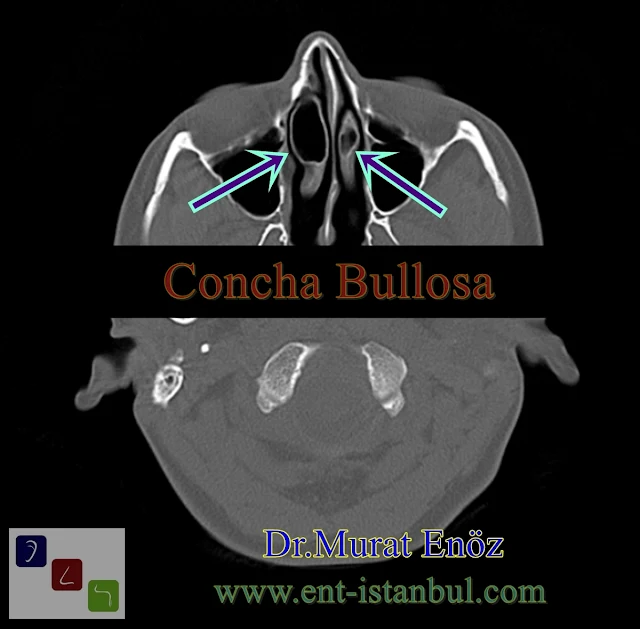Pneumatized (Air-Filled) Middle Turbinate (Aereted Concha)
Turbinates are the names given to the meats found anatomically in our nose. There are three nasal concha (concha) in each nasal cavity, upper, middle and lower. The middle turbinates (or the middle nasal concha) are located especially at the opening of the sinuses to the nasal cavity, and the growth or anomalies of these turbinetas can adversely affect the aeration of the sinuses.
Concha Bullosa Operation Indications
In the nose, there are 3 turbinates in each nasal cavity. Middle turbinates are located especially close to the opening channels of the maxillary sinuses and other sinuses into the nasal cavity. Pneumatization of the middle turbinates ie "concha bullosa" is not an abnormal condition or a reminder of a disease; is a developmental condition. When these turbinates are abnormally large, they can adversely affect the drainage of the sinuses. In this way, they may cause infections in adjacent sinuses and surgical treatment may be required.
Surgical Treatment of Concha Bullosa
Treatment is not necessary in all patients with concha bullosa. Every anatomical structure in the nose has its own specific tasks and no tissue is superfluous!
In patients with concha bullosa causing abnormal large and sinus problems, one of the following techniques can be applied (the duration and technique is very short and easy, and the results are extremely satisfactory for the patients.)
- endoscopically middle turbinate resection
Complete resection of the concha bullosa is usually not resolved, resulting in an abnormal increase in volume in the nose.
- partial resection of concha bullosa endoscopically
As seen in the video above, a partial middle turbinate resection can be performed after injecting local anesthetic into the concha bullosa mucosa with the help of an endoscope.
- Clamping the concha bullosa by clamping it, reducing or eliminating the air space in the middle. This technique involves the least anatomical changes. In this way, the middle turbinate volume is reduced and no anatomical changes are made.
- Partial or total removal of the turbinate bone after the turbinate mucosa is elevated (Endoscopic Turbinoplasty).
Concha Bullosa Mucopyocele
Concha bullosa is a common variation, mostly seen in the middle turbinate. Mostly it doesn't cause any symptoms. When the concha bullosa is extremely large, it can cause problems such as headache, nasal congestion, and decreased sinus discharge. The space inside the concha bullosa may be filled with inflammation after upper respiratory tract infection. This condition is called "Concha Bullosa Mucopyocele" or "Middle Concha Mucopiocele". It often causes headaches similar to migraine headaches. In the treatment, removal of half of the middle turbinate by endoscopic sinus surgery technique and drainage of the inflammation is sufficient.
Concha Bullosa Operation Cost
Generally, Concha bullosa operation is performed together with other nose operations. Operation can be performed under local or general anesthesia. The operation price of endoscopic concha bullosa resection varies between 1750 - 2500 US dollars depending on the hospitals.
Normal and Healthy Middle Turbinate
 |
| The photo above shows the right middle turbinate in normal shape and size (photo taken during normal examination of a patient without any nasal complaints). |
Source links >> (PDF) Mucocele of the middle turbinate: A rare entity (researchgate.net) / Middle turbinate mucopyocele: a case report (scielo.br) / Pyocele of the middle turbinate | The Journal of Laryngology & Otology | Cambridge Core / Concha bullosa | Radiology Reference Article | Radiopaedia.org / Concha bullosa - an overview | ScienceDirect Topics
Murat Enoz, MD, Otorhinolaryngology, Head and Neck Surgeon - ENT Doctor in Istanbul
Private Office:
Address: İncirli Cad. No:41, Kat:4 (Dilek Patisserie Building), Postal code: 34147, Bakırköy - İstanbul
Appointment Phone: +90 212 561 00 52
Appointment Phone: +90 212 561 00 52
Fax: +90 212 542 74 47








Comments
Post a Comment